- Category
- War in Ukraine
How Russia’s War on Ukraine’s Frontline Hotels Became a War on Truth
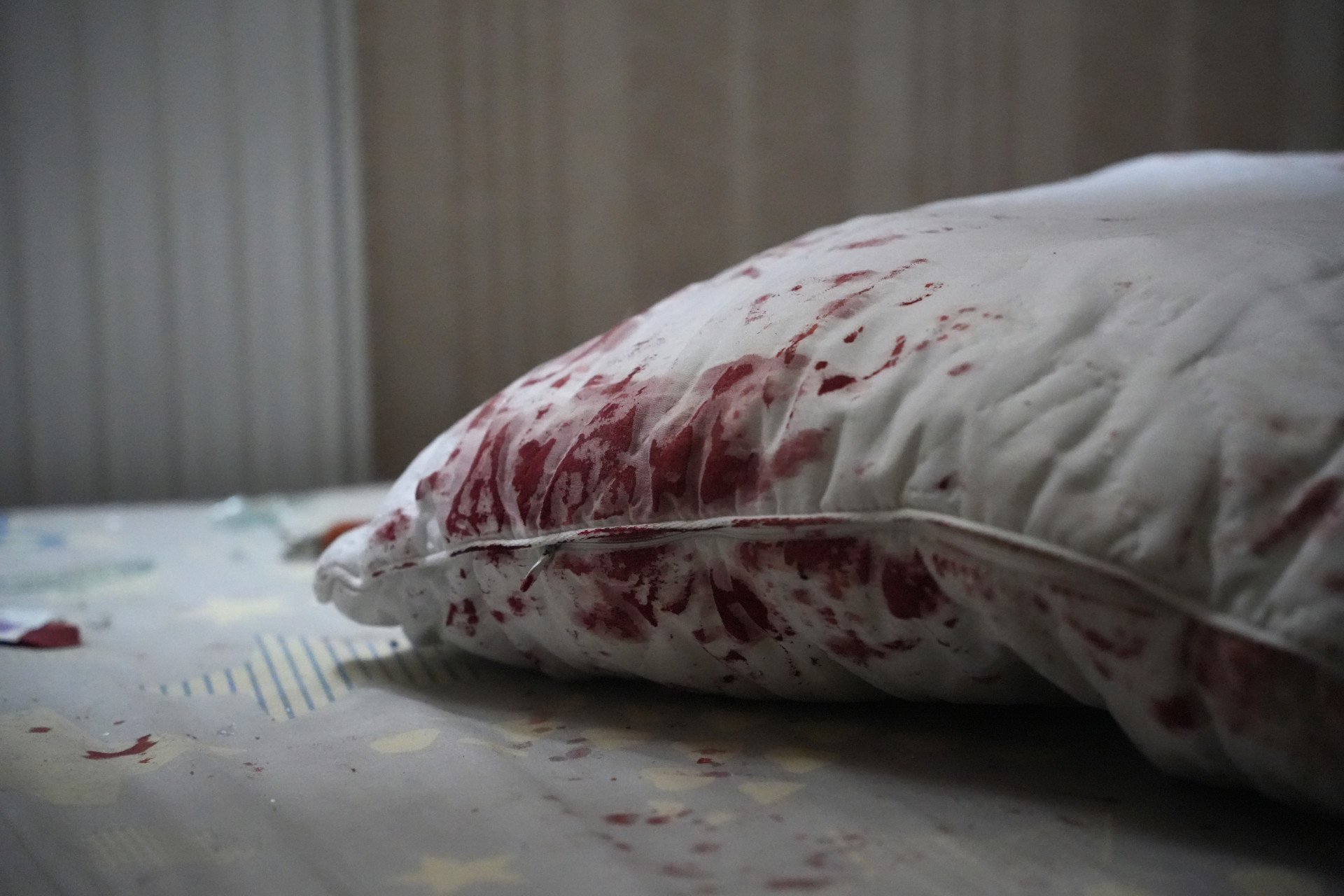
Russian missiles are turning hotels—places of rest and safety—into weapons of fear. A new report reveals Moscow’s calculated strategy to terrorize civilians, silencing the press, resulting in a buried truth and a wider spread of Russia’s disinformation.
In peacetime, hotels are places of rest and retreat. In war, they become a base for civilians, housing journalists, aid workers, and civilians fleeing violence, making hotels a desirable target for terrorists.
From Myanmar to Lebanon, and across Ukraine, hotels have repeatedly come under deliberate targeted attack.
In wartime, hotels become a lifeline, offering what little stability remains–food, water, electricity, and internet. Hotels often meet insurance requirements for media workers, of “safe” accommodation. However, aggressive actors waging war are making them increasingly dangerous by deliberately targeting them.
The message projected by these strikes is clear: no civilian is safe.
Truth Hounds
A new report, Last Check-In: The Russian Strikes on Ukrainian Hotels Silencing the Press, by Truth Hounds (TH) and Reporters Without Borders (RSF) reveals that Russian forces are deliberately targeting hotels to silence the press.
Hotel attacks are neither random nor incidental, but form part of a broader strategy to intimidate the media and obstruct frontline reporting. These attacks constitute a war crime, a crime that has instilled extreme fear among civilians, causing death and injury to many.
How many hotels has Russia targeted in Ukraine?
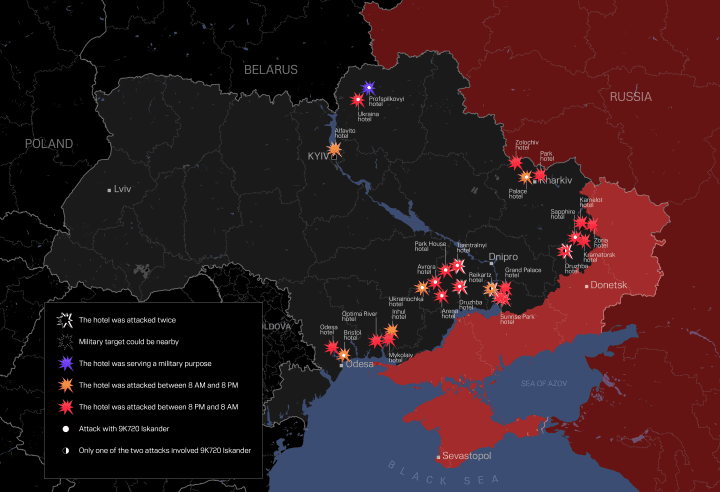
Between 24 February 2022 and 15 March 2025, Russian forces attacked Ukraine's hotels at least 31 times. Eight hotels were attacked in 2022, five in 2023, but in 2024, attacks escalated with 14 in total, 11 attacks occurring between August and October 2024.
In early 2025, four attacks occurred in less than two months. The report found that the growing intensity of these attacks “suggests a possible evolution in targeting practices.”
Most of the attacks were against fully operational hotels, highlighting that these attacks may be part of a broader strategy of intimidation and disruption by Moscow.
Why does Russia attack hotels?
During wartime, hotels assume a critical role for civilians, such as the media, volunteers, and IDPs (internally displaced persons). The report suggests that civilians attacked while residing in hotels may be targeted for what they symbolise, such as foreign influence.
Attacking civilians gains significant attention, allowing those launching the attack to amplify their message, often globally. Hotels are considered ‘soft targets’ that have minimal security measures in place compared to military facilities, making them easier targets.
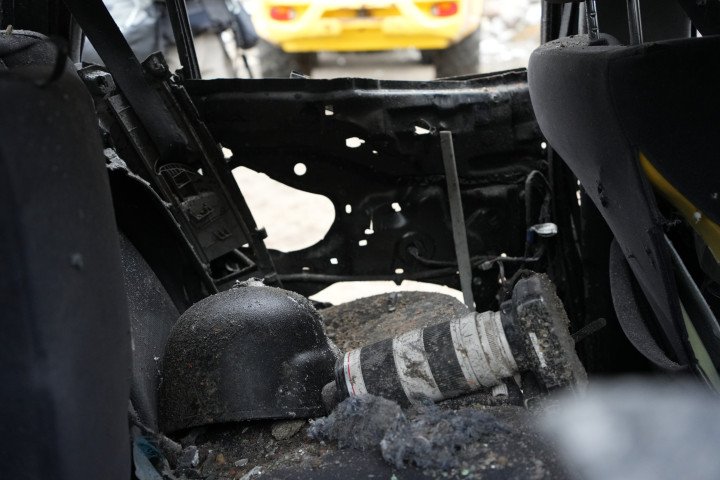
Russia’s pattern of attacks on hotels
The report analysed all 31 attacks, and though details of the attacks vary, certain patterns have emerged. In particular, the repeated targeting of hotels known to host journalists, humanitarian workers, volunteers, and other civilians.
Geographical pattern: 27 strikes occurred in regions experiencing active hostilities
Temporal pattern: 23 strikes occurred between 8:00 pm and 8:00 am
Hotel status pattern: 30 of the 31 attacks targeted hotels without a clear-cut military use
Precise striking pattern: At least 15 attacks involved missiles launched from Iskander 9K720 missile systems
A key pattern across the attacks is the targeting of civilian sites with no military purpose—many of them known shelters for journalists, aid workers, and displaced civilians.
The report highlights the coordinated timing of the strikes, further underscoring the evidence of deliberate intent. Hotels would usually be at their busiest during the night, while civilians rest; therefore, attacking them during these hours is a calculated effort to inflict maximum harm.
A variety of weapons were employed during the attacks, primarily ballistic and cruise missiles. While their precision can vary, systems like the Iskander 9K720 are known for high accuracy, reinforcing the conclusion that these hotels were intentionally targeted.
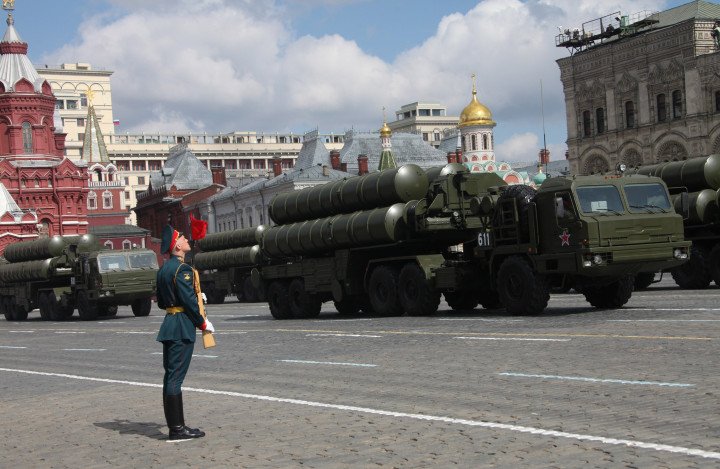
Which hotels housing media workers have been attacked by Russia?
International media crews have mostly been impacted by Russian hotel attacks. Independent investigators face challenges in tracking the full extent of these strikes due to limited coverage and restricted access to reliable information.
Kharkiv Palace Hotel, Kharkiv
On 30 December 2023, a Russian ballistic missile struck the upper floors of the hotel building. Svitlana Dolbysheva, a local Ukrainian producer and a security adviser (a British citizen) for the German TV broadcaster ZDF, was injured. Five ZDF team members, a New York Times photographer, and local producer, Oleksandra Mykolyshyn, were also at the hotel at the time of the strike.
As I opened my room door, I didn’t see the large open lobby as usual, but instead darkness and black smoke. I didn’t know if my colleagues were alive or what was left of this building
Alica Jung
ZDF Journalist
Park Hotel, Kharkiv
On 10 January 2024, the Park Hotel was hit by two missiles reportedly launched from an S-300 (S-400) system. Reporter Davit Kachkachishvili, working for the Turkish news agency Anadolu, and a local Ukrainian producer for the French TV channel France 2, Violetta Pedorych, were injured.
Hotel Sapphire, Kramatorsk
On 24 August 2024, a Russian 9M723 ballistic missile struck Hotel Sapphire, killing Ryan Evans, a British citizen working as a safety adviser for Reuters.
9 others were injured, including Reuters American journalist Dan Peleschuk and Ukrainian cameraman Ivan Lyubysh-Kirdey. Several witnesses reported that there were no military personnel or military equipment near the hotel before or during the attack.
On 20 December 2024, the Security Service of Ukraine (SBU) announced that it had gathered sufficient evidence to charge Russian Colonel General Alexei Kim with committing a war crime by ordering the strike on Hotel Sapphire.
Kim was “fully aware that the individuals were civilians and not participating in the armed conflict”, the SBU reported. The SBU emphasised that the strike was launched to destroy a building exclusively occupied by civilians, including journalists, an act that constitutes a clear violation of international humanitarian law (IHL).
Russia’s rhetoric and justification for its attacks
Following the attacks, the Russian Ministry of Defence (MOD) sought to justify its hotel strikes by alleging the presence of Ukrainian armed forces, intelligence operatives, or foreign mercenaries. However, independent investigators have found no evidence to support these claims.
In the case of the Hotel Sapphire, before the attack, the Ministry acknowledged the presence of journalists but alleged their coordination with SBU to stage events for media coverage, aimed at influencing Western military support.
However, under IHL, such groundless claims do not affect the civilian status of journalists; therefore, they still constitute a war crime against civilians.
Kremlin spokesperson Dmitry Peskov hasn’t claimed that the hotel itself was used for military purposes; instead, he attempts to cast doubt on the civilian status of individual victims.
Russian Foreign Ministry spokesperson Maria Zakharova labeled Ryan Evans as a former agent of MI6. Russian Telegram channels such as Dva Mayora, amplified this justification by emphasising the prior military experience of Ryan Evans, who was a former British serviceman.
However, if a media professional, in this case, Ryan Evans, is no longer in the armed forces, not currently serving, nor taking part in hostilities, they remain civilians.
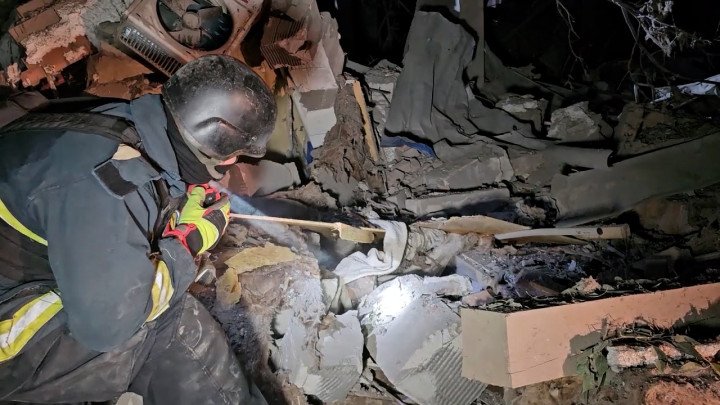
Deliberate attacks on hotels are war crimes
Under IHL and international criminal law (ICL), attacks on hotels accommodating civilians, including journalists and humanitarian workers, may constitute grave breaches of international humanitarian law and war crimes.
Under IHL, attacks may only be launched against military targets; intentionally targeting civilians or civilian objects is prohibited. Therefore, journalists, humanitarian workers, and other civilians staying in hotels are protected.
Russia’s Ministry itself recognized that Hotel Sapphire was housing journalists, yet targeted it nonetheless, evidencing that the strike was both unlawful and deliberate.
Russia’s repeated strikes on hotels, including Hotel Sapphire, show no legal basis under IHL for the targeting of a military object. With no evidence of military use, these attacks appear to constitute the war crime of deliberately targeting civilians and civilian objects.
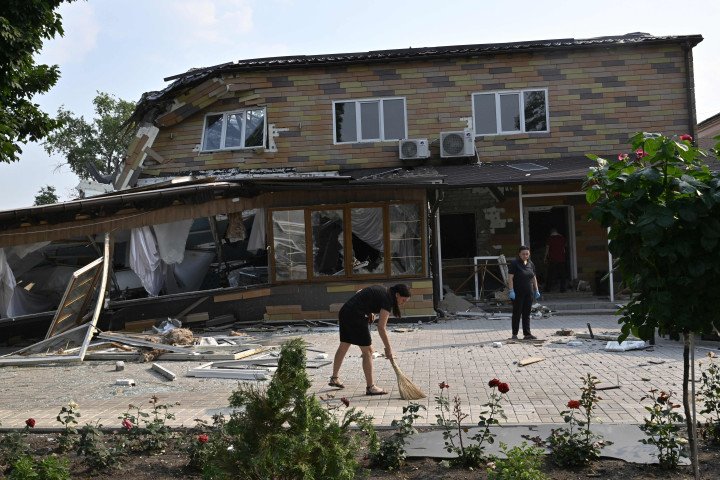
Russia’s acts of terror against civilians
A survey by TH gathered 80 responses from both Ukrainian and foreign media workers about their use of hotels while reporting in Ukraine.
From 2023, 55% of Ukrainian respondents stayed in hotels near the frontline, while only 21% said rarely or never. By late 2023, 64% of the respondents said they rarely or never stayed in hotels due to increased deliberate attacks.
49% of foreign correspondents stayed in hotels almost every work trip during 2022 - 2023, and by late 2023, this figure dropped to 23%.
Death can occur at any time and in any location
Journalist
According to the TH and RSF survey, more than half of the Ukrainian respondents highlighted the psychological consequences, heightened stress levels, and emotional trauma caused by the constant threat of being attacked.
These threats, combined with logistical and security challenges, have made frontline reporting in Ukraine increasingly dangerous.
While the Geneva Conventions don’t define “terrorism,” IHL clearly prohibits acts commonly understood as terror-related, intended to spread fear among civilians.
Acts or threats of violence, the primary purpose of which is to spread terror among the civilian population, are prohibited
International Humanitarian Law
Targeting hotels—spaces meant for rest and safety—intensifies psychological harm and deters media presence.
The specific intent to spread terror is reflected in changes in the documented avoidance of hotels by media professionals; such acts meet the threshold for war crimes under international law.
The repeated, patterned, and deliberate targeting of hotels by Russian forces exposes the deep uncertainty surrounding so-called “safe zones” for journalists and aid workers in Ukraine.
Truth Hounds concludes that Russia is violating, and blatantly disregarding its obligations under IHL, treating journalists as expendable—or even as legitimate targets. The result, restrictions on reporting, suppressed truth, and a wider spread of disinformation.
The report calls for accountability and reinforced protections for media teams. No journalist or media professional who does not take part in hostilities should ever be regarded as a legitimate military target.
-46f6afa2f66d31ff3df8ea1a8f5524ec.jpg)

-554f0711f15a880af68b2550a739eee4.jpg)



-206008aed5f329e86c52788e3e423f23.jpg)
-1afe8933c743567b9dae4cc5225a73cb.png)